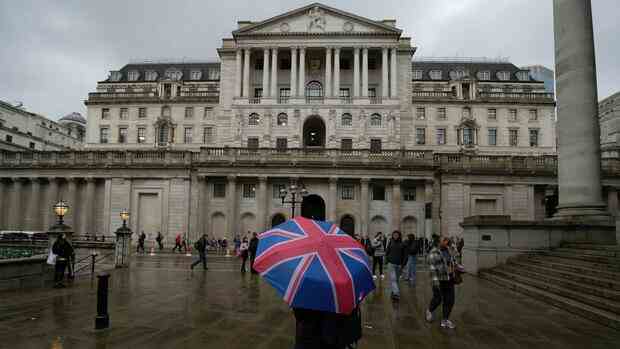In November, the central bank carried out the largest rate hike in 33 years with an increase of 0.75 percentage points.
(Photo: AP)
London The Bank of England (BoE) raised interest rates in the UK by half a percentage point to 3.5 percent on Thursday. This is the highest level in 14 years and the ninth interest rate hike in a row. It comes a day after the US Federal Reserve (Fed) also announced a 50 basis point rate hike. Six UK central bankers voted in favor of the rate hike, two would have preferred not to do so and one central banker voted for a 75 basis point hike. At the beginning of November, the BoE had already hiked interest rates by three-quarters of a point.
Similar to America, inflationary pressure has eased somewhat in the UK. Consumer prices rose 10.7 percent in November, after 11.1 percent in the previous month. However, inflation is still five times higher than the central bank’s target of two percent. Analysts are therefore anticipating further interest rate hikes in the coming months and see the key interest rate peaking at around 4.5 percent.
The UK central bankers’ job is particularly tricky given that the UK has the lowest growth and highest inflation of the top seven industrialized nations, according to the Organization for Economic Co-operation and Development (OECD). The currency watchdogs are therefore trying to keep the collateral damage to growth as low as possible in the fight against inflation. The BoE believes the UK economy is already in recession and the downturn could last until 2024.
The difficult balancing act has also led to disagreement among central bankers on the BoE’s monetary policy committee. Former Citibank economist Catherine Mann is urging rate hikes to keep inflationary expectations in check in the economy.
Top jobs of the day
Find the best jobs now and
be notified by email.
Others, such as economics professor Silvana Tenreyro, consider the current course to be sufficient to achieve the inflation target. The majority stressed that “further interest rate hikes may be needed to achieve a sustained return of inflation to target”.
In particular, the continuing tightness on the British labor market is causing central bankers to worry that a wage-price spiral could occur. “Domestic wage and price pressure has increased,” write the central bankers.
Public sector workers are on strike for higher wages
Private sector wages rose nearly 7 percent in the three months to October. In the public sector, which is currently being hit by the largest wave of strikes in 50 years, wage growth was only 2.7 percent. With inflation in double digits, real wages and living standards have fallen for all workers, but public sector workers have been hit particularly hard.
“Inflation is enemy number one,” Treasury Secretary Jeremy Hunt said. The British government therefore does not want to give in to the wage demands of 100,000 nurses who have been on strike since Thursday and whose union is demanding wage increases of up to 19 percent.
However, economists believe that the assumption that higher public sector wages could fuel inflation is far-fetched. “Higher wages for nurses do not lead to higher healthcare prices,” said Jonathan Portes, an economics professor at King’s College London.
More: Worry about wage-price spiral: Swiss central bank doubles the key interest rate
